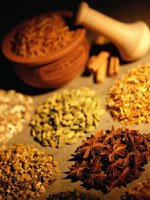
A study published in the Journal of the American Medical Association caused some alarm about Ayurvedic medicines. Researchers analyzed 70 remedies and found that 14 of them contained levels of lead, mercury, and/or arsenic that exceeded U.S. Pharmacopeia and Environmental Protection Agency standards. But instead of tossing out your ashwagandha or gotu kola, or abandoning the idea of Ayurvedic medicine altogether, consider taking these steps to keep your herbs safe for everyone in your family.
Research manufacturers online. Find out if they test their products for heavy metals, what ingredients they use, and where those ingredients are from.
Read labels. By law, all ingredients in a dietary supplement must be listed on the label. If they're not, that should be a warning: If they aren't listed by their botanical names or common English names, that's another red flag.
Purchase products only from reputable retail outlets. Natural food stores, the primary distribution channel in the U.S., are reliable sources for Ayurvedic medicines.
Use Ayurvedic herbs in their natural form, if possible. For instance, karela (bitter melon), a vegetable that regulates blood sugar, is most effective when eaten fresh. "Ayurveda is a lifestyle methodology, not a drug-taking methodology."
Consult a specialist. If you've been using herbs imported from Asia and are concerned about your health, see your Ayurvedic specialist or health care practitioner.
Heavy metal toxicity can be detected by a physical exam or through a blood test. Possible symptoms are abdominal pain, fatigue, irritability, muscle or joint pain, and neurological dysfunction, including seizures.
0 comments:
Post a Comment